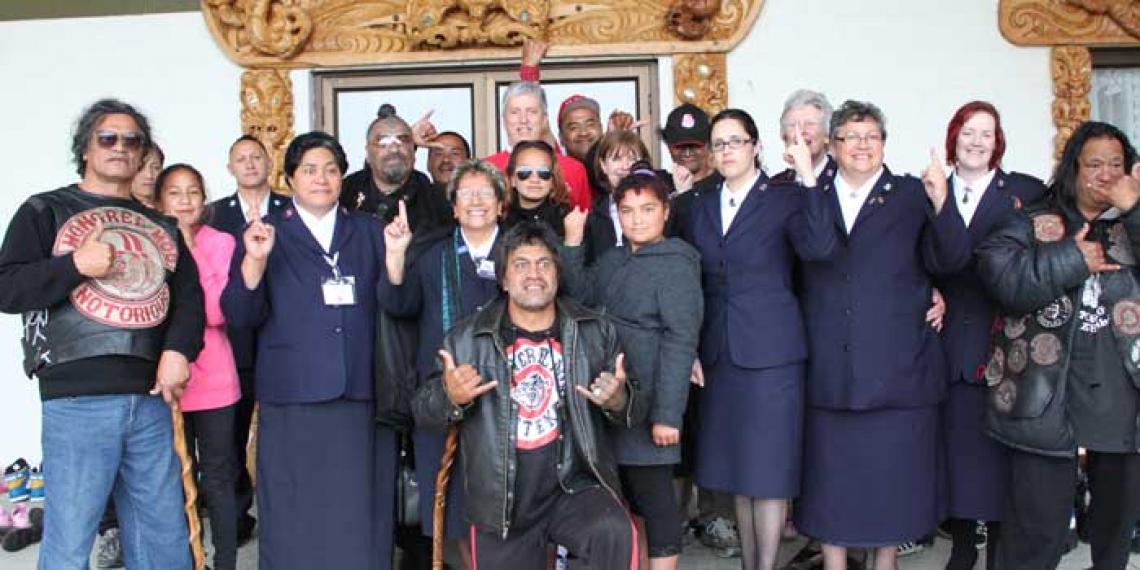You are here
Journeying together for a second chance

Roy Dunn, along with other senior members of the Notorious Chapter of the Mongrel Mob, approached The Salvation Army to establish a partnership to combat ‘P’ (methamphetamine) addiction.
The Hauora Programme recently completed its fifth intake, and awaits news on future funding.
The drug world loomed large on us when ‘P’ entered the market in the way it did in New Zealand. Our whanau were being devastated. It was clear we had a huge problem.
It has taken 14 years to get to the point where we are finally getting help to battle addiction. In those years, many people in society did not take us seriously. They viewed us with suspicion and mistrust. I can see why. I think it’s fair to say we continue to be viewed as the baddest of the bad.
Many of my fellow leaders among the Mongrel Mob and other clubs could not understand what I was doing. We have had to lead by example, and it’s been like the blind leading the blind. I recall saying, ‘Everybody deserves a second chance.’ Well, the past 14 years have been about getting that second chance.
Knocking on doors asking the community to help us was like pulling teeth. What we did discover was that ones and twos saw the vision. They gave us that second chance and we were able to move forward—small steps at a time.
The interesting thing we discovered is that our own people remained at a distance. Not wanting to embrace change. Not willing to give others that second chance. We knocked on many marae doors, only to be greeted with, ‘De-robe. Take your patch off and you can enter this place.’
In 2006, the Notorious Chapter celebrated 25 years together. The theme of that celebration was the drive to eradicate ‘P’ from the club. As I have said, not all club leaders embraced this kaupapa (principle). One of the things I have learned is that you can’t make people do what they don’t want to do. So I started with the small numbers of those that wanted to make those exchanges.
We developed a concept that looked at how to work toward helping our whanau become free of ‘P’. Our concept was the ‘Hauora centre’.
The Salvation Army’s leadership gave us that second chance we were looking for, agreeing to work with us on the Hauora Programme. We have lived together for three years now and are still learning that we are very different in our value systems. We haven’t taken off our patches and are still Mongrel Mob members.
So what difference has the three-year journey together made? We have learned that:
- we can embrace each other’s differences and still like each other
- we can accept each other just as we are
- we can learn from each other some of the key lessons we all need to know, such as how to look after each other.
As each rehab programme has come and gone, the reality of how entrenched my bros are in their way of life is still a big reality for me. I now spend my time asking the question: How or what is it we need to do to make sure our children don’t become normalised to drugs?
For many of my bros, they would not see that our lifestyle is or should be any different to what they have always known. I’m sure the Sallies look at us sometimes in horror because of this. But that’s all part of the journey.
When our whanau arrive at rehab, we discover how some of them have been living—and the effects of this on their kids. Many onlookers could say that we do things to excess, and maybe that is true. Our journey so far has been about learning. We still do and get things wrong because we don’t necessarily know how to do things differently. I ask my leaders all the time to consider changing what they know for a different way. I haven’t always had total acceptance of this journey. It continues to be one step at a time.
As our rehabs have progressed—we have just had our fifth rehab programme—I ask myself, has this journey been worth it? I guess my answer is that every time I bury another one of my bros, my gut turns, and so I keep going on this journey. I remind myself of where we have come from and our vision to see our children free. Our vision to know and understand values that see us embrace that which we are good at: being whanau, looking out for each other, and having a good future for our kids.
Wanting a different lifestyle for our kids is not a difficult thing. Working out how to exchange our way of thinking for a better way so that this happens can be hard.
By Roy Dunn (from War Cry magazine, 12 January 2013, p11)